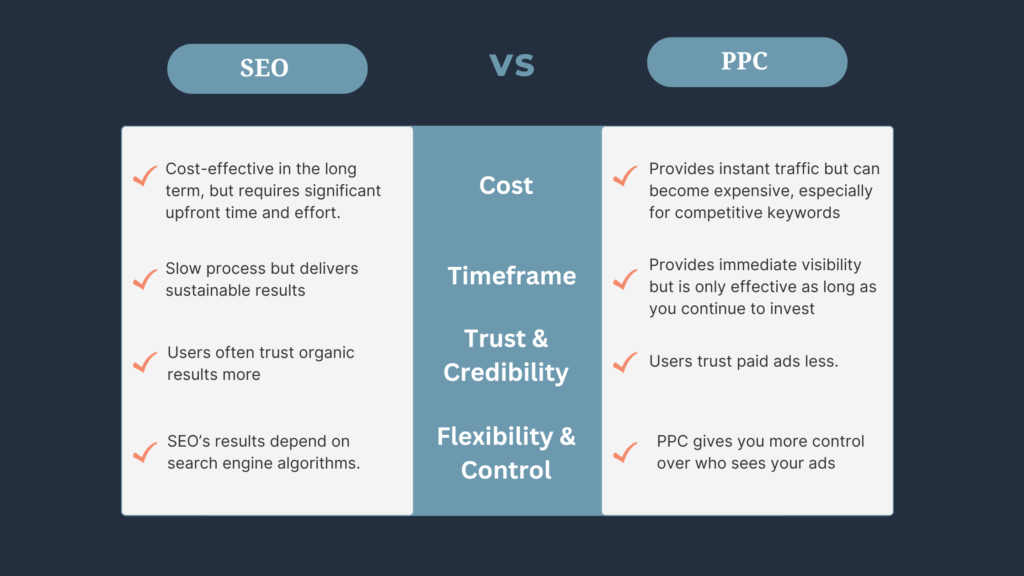Table of Contents
In today’s fast-paced digital world, businesses strive to stand out from the competition by leveraging effective marketing strategies. Search Engine Optimization (SEO) and Pay-Per-Click (PPC) are two of the most powerful digital marketing tactics that can drive traffic, increase visibility, and boost conversions. But which strategy should you focus on mastering? In this blog, we’ll explore the key differences between SEO vs. PPC, their advantages, and which one you should prioritize to maximize your marketing efforts.
What is SEO?
Search Engine Optimization (SEO) refers to the process of improving a website’s organic ranking on search engines like Google. SEO involves optimizing your website content, structure, and off-site factors like backlinks, to rank higher on search engine results pages (SERPs). The goal of SEO is to drive organic traffic—visitors that find your site through unpaid search results.
Benefits of SEO:
- Long-term Results: Once you rank well on search engines, the results are often long-lasting, requiring only maintenance.
- Cost-Effective: Organic traffic is free, and while SEO requires an investment in time and effort, it can yield high ROI over time.
- Brand Credibility: Websites that appear on the first page of search results are generally seen as more credible and trustworthy.
Drawbacks of SEO:
- Time-Consuming: Achieving top rankings can take months of dedicated work.
- Algorithm Dependency: Search engine algorithms frequently change, which can affect your rankings.
What is PPC?
Pay-Per-Click (PPC) is a digital advertising strategy whereby advertisers incur a cost each time their advertisement is clicked. These advertisements are prominently displayed above organic search results, usually positioned at the top of Search Engine Results Pages (SERPs). Platforms like Google Ads allow you to create targeted campaigns based on specific keywords that match users’ search queries.
Benefits of PPC:
- Immediate Results: Unlike SEO, PPC delivers instant visibility once your ad campaign goes live.
- Control Over Targeting: You can tailor your ads to specific audiences based on demographics, location, interests, and more.
- Measurable ROI: With PPC, you can track performance metrics in real time, helping you optimize your ad spend effectively.
Drawbacks of PPC:
- Costly: Every click has a price, and if you’re in a competitive industry, the costs can skyrocket.
- Short-Term Impact: Once your ad budget is exhausted, the traffic disappears.
SEO vs. PPC: Key Differences
- Cost: SEO is cost-effective in the long term, but requires significant upfront time and effort. PPC, on the other hand, provides instant traffic but can become expensive, especially for competitive keywords.
- Timeframe: SEO is a slow process but delivers sustainable results, while PPC provides immediate visibility but is only effective as long as you continue to invest.
- Trust and Credibility: Users often trust organic results more than paid ads, giving SEO an edge in terms of credibility.
- Flexibility and Control: PPC gives you more control over who sees your ads, while SEO’s results depend on search engine algorithms.

Which Strategy Should You Master?
When deciding between SEO and PPC, the answer largely depends on your business goals, budget, and timeframe.
- If you’re looking for long-term growth and credibility, SEO is the way to go. Mastering SEO can provide a sustainable flow of organic traffic, boosting your brand’s visibility and authority over time.
- If you need immediate results and are working with a flexible budget, PPC is an ideal choice. With PPC, you can quickly generate leads, especially for time-sensitive promotions or products.
However, the best approach is often a hybrid strategy that combines the strengths of both SEO and PPC. While SEO builds a foundation for organic traffic, PPC can complement it by driving immediate visibility and targeted traffic when needed.
Conclusion
Both SEO and PPC are vital components of any successful digital marketing strategy, but mastering the right one depends on your specific business needs. SEO offers long-term, sustainable growth at a lower cost, while PPC delivers instant results with more precise targeting. For many businesses, learning to balance both strategies can provide the best of both worlds—ensuring steady traffic and conversions in both the short and long term.
By investing in learning both SEO and PPC, you’ll be well-prepared to handle various digital marketing challenges and stay ahead of the competition.
For more such information do check out our other posts. Click here!
What is SEO?
Search Engine Optimization (SEO) is the process of optimizing a website to improve its ranking on search engine results pages for relevant keywords. The goal of SEO is to increase organic (non-paid) traffic by making a website more visible and relevant to users’ search queries. SEO involves several techniques, including keyword research, on-page optimization (like improving content and meta tags), off-page optimization (like building backlinks), and technical improvements to enhance site speed, mobile-friendliness, and overall user experience.
What is PPC?
Pay-Per-Click (PPC) is an online advertising model where advertisers pay a fee each time someone clicks on their ad. These ads appear on search engines like Google or on social media platforms, targeting specific keywords or audiences. PPC allows businesses to gain immediate visibility by placing their ads at the top of search results or in relevant locations across the web.
What is the difference between SEO and PPC?
SEO focuses on improving a website’s organic ranking on search engines, while PPC involves paying for ads to appear at the top of search results.
Which is better for long-term growth: SEO or PPC?
SEO is better for long-term growth, as it helps generate sustainable, organic traffic over time, whereas PPC provides short-term, immediate results.
